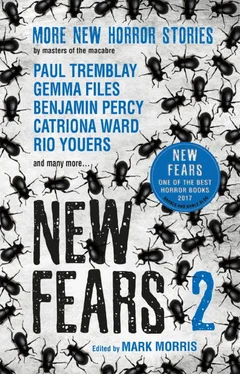“On the other side of the tree, the river spread out dramatically. Dozens of trees, each the same species and dimensions as the one they had passed, reared from the water, a flooded forest. In the twilight the trees reminded Conrad of great beasts, a herd of prehistoric animals gathered in the water to relieve the heat of the day. It was an astonishing sight, which had not been so much as hinted at during Conrad’s time at the spa. This strained belief. Surely, he thought, a location as remarkable as the one into which the steamboat was sailing should be the pride of its location, should it not?”
Within each of the red lights around the classroom, a darker form appeared, a thick column suggestive of the trunk of a tree, viewed from a distance. While Mr Haringa’s pocket watch counted its time, the shapes to the class’s left became larger, the light on that side dimmer, as if the students were sailing this way. A handful of them felt the floor shift under the soles of their shoes, rising and falling as it would were they on the deck of a boat pushing up a river.
Although he had not changed his position in front of his desk, Mr Haringa’s voice sounded closer; eyes closed, each student might have believed their teacher was seated beside them. As he continued with his narrative, the shadowy forms bisecting the rest of the red lights expanded, until it seemed the immense trees of his story surrounded the class. He said, “Employing signposts Conrad could not identify, Heuvelt sailed a winding course through the forest. Although he considered himself possessed of a superior sense of direction, Conrad soon lost track of which way they were travelling. Thinking he would regain his bearings by checking the stars already visible overhead, he leaned out from under the boat’s roof. But he recognized none of the constellations burning in the sky from which the last traces of red had yet to vanish. This was impossible, of course, and he wondered if the crowns of the trees spreading between him and the stars were in some way distorting his view, which was not much more likely, but preferable to the other explanations available. He retreated beneath the roof and saw Heuvelt watching him, the expression on the man’s face an indication that he knew and had shared Conrad’s observation. Such confirmation was almost too much to bear, Conrad later wrote; rather than acknowledge it, he asked Heuvelt if their destination had a name.
“In reply Heuvelt said, ‘ Haak .’ During his years at sea, Conrad had picked up a smattering of Dutch, but this word was unfamiliar to him. He started to ask for a translation when the steamboat chugged out of the trees into a wide pool in which sat the wreck of a great ship. It was a Spanish galleon, what you or I might imagine as an old-fashioned pirate ship, with three masts for its sails, a raised deck at its rear, and square windows perforating the sides for its cannons. Centuries had passed since such vessels had been in widespread use. The ship was tilted to the right, its wood blackened with age. Gaping holes in its left flank exposed its ribs. Its foremast had broken near the base and tipped into the water. The mainmast and mizzenmast were intact, the ragged remains of their sails and rigging draped from them like faded bunting. Amidst the tattered canvas, Conrad picked out shapes dangling from the masts, the corpses of a score of men, their flesh desiccated, their clothing rotted. They had been hanged, their hands tied behind their backs.”
Now the darker columns within the red lights faded, to be replaced by a variety of shapes. At the front of the room, shadowy arcs suggested a ship’s ribbing, while thick diagonal lines to either side of the students stood in for the tilted masts. Interspersed among these shapes were the silhouettes of men at one end of a heavy rope, their necks crooked. Only the lights at the back of the class were absent any form, and the glow they cast forward highlighted Mr Haringa in a hellish luminescence through which the waistcoat was visible in its own scarlet hue. The pocket watch had increased in volume to the point its TICK-TOCK shuddered the students’ desks, and not a few of them wondered how much longer it would be until a teacher in one of the neighbouring rooms stuck their head in the door to request Mr Haringa turn down the noise.
His voice in each student’s ear, Mr Haringa said, “Conrad was stunned. As if a flooded forest in the Swiss mountains was not fantastic enough, the wreck of a huge, ocean-going ship in its midst defied explanation. There was no river large enough to have borne the galleon anywhere within fifty miles of the place. In his time at sea, Conrad had heard sailors relate glimpses of islands not on any maps, of vessels from centuries gone by. He was enough of a rationalist to ascribe the majority of these accounts to old and incomplete maps, to the confusion of distance and poor eyesight, but he was also enough of a sailor himself, to recognize that the immensity of the ocean held room for all manner of things. Although he had thought them far from the sea, it appeared the sea was not far from them. Combined with the unfamiliar constellations overhead, the remains of the ship indicated Heuvelt had taken them into one of those strange countries whose coastlines he had heard described.
“Heuvelt guided them around to the galleon’s top side, keeping a wide distance between the steamboat and the masts with their tangle of sails. Throughout the trip so far, he had maintained a more or less constant speed, which he reduced as they circled the wreck. One eye on the ship, one on their course around it, he said, ‘You have heard of the Armada, yes? The great fleet the Spanish king sent to invade England when Elizabeth was her queen. One hundred and thirty ships, it was said. It was defeated by the English Navy’s ships, which were smaller and faster, and its tactics, which were superior. There is no one as ruthless as an Englishman. The Spanish captains chose to flee up the English and Scottish coast. Their enemies pursued them all the way. North of the Orkney Islands, the Spaniards turned west, intending to sail down the western side of Scotland into the Irish Sea. As they entered the open Atlantic, however, a ferocious storm greeted them. All along northwest Scotland and northeast Ireland, Spanish sailors were shipwrecked and came ashore. Many were killed by the populace. A few were given shelter by those Britons unfriendly to their queen.
“‘There was one ship whose captain sought to escape the catastrophe of the Armada by sailing directly into the storm. He trusted his ability to navigate the wind and waves, and his crew to follow his commands. The English captains saw him heading toward the gale and allowed him to go, sure the Spaniard would not outlive his disastrous choice.
“‘You know what it is like on a ship during a storm. The English were not wrong to let the Spanish vessel escape; they must have assumed the captain was choosing to die in this fashion, rather than at the edges of their swords. They were not familiar with this commander, Diego de la Castille, who was new to the responsibility of a ship but was a gifted sailor and inspiring leader. Although Poseidon struggled mightily to bring the vessel and its crew to his watery halls, the captain outmanoeuvred him, and exited the other side of the storm.
“‘Perhaps the old god had the last laugh, though, because when the wind quieted and the waves calmed, the ship was in a location not even the most seasoned hand recognized.’
“Conrad said, ‘This place.’
“‘Yes,’ Heuvelt said, ‘this place of great trees rising from the water, of a hundred scattered islets.’ The steamboat had drawn opposite the tip of the mainmast. So distracted had Conrad become by Heuvelt’s story that he did not notice the boy crouched on the end of the mast until he uttered an exultant, blood-curdling whoop and leapt toward them. Heuvelt had kept a good fifteen yards between their boat and the mast, but the child crossed the distance effortlessly. He landed on the steamboat’s roof with a solid bang, scurried along it to the front of the boat, and dropped onto the deck before the men. Only Heuvelt’s raised hand restrained Conrad from fleeing the short sword whose tip was suddenly pointed at his throat. Already Heuvelt was speaking, a patois of Spanish and another tongue Conrad recognized as Greek, but of an older, a much older, form. From what Conrad could understand, the man was urging calm to the child aiming his blade at the base of Conrad’s neck. Panos, Heuvelt called the boy, who was perhaps ten or eleven, his long hair sun-bleached, his bronzed forearms and legs bare, latticed with white scars. He was wearing a scarlet coat, whose sleeves had been hacked off above the elbows, and whose ragged hem hung down to his calves; despite the antique style, Conrad saw its gold brocade and knew it at once as the garment of a ship’s captain. Underneath the coat, the child was dressed in a tunic stitched together from large yellowed leaves. A worn strip of leather served him as a necklace for a steel hook, of the kind a man might substitute for a hand lost to violence. Conrad recalled the name Heuvelt had given this place and said, ‘This is Haak ?’
Читать дальше












